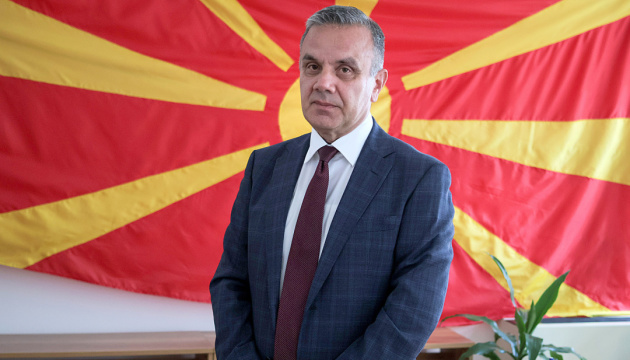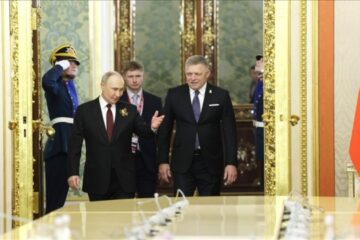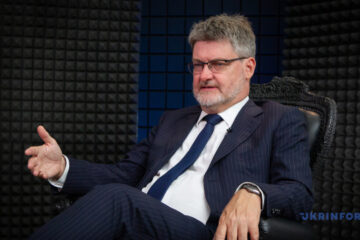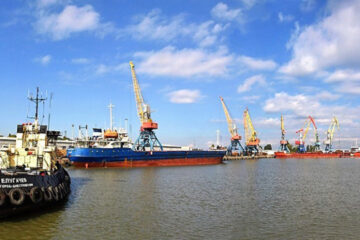The Second National Prayer Breakfast gathered over 1,000 guests, including more than 350 foreign participants. Among them was Zoran Dimitrovski, Deputy Minister of Foreign Affairs of the Republic of North Macedonia.
Since July 23, 2024, Zoran Dimitrovski has held the position of Deputy Minister of Foreign Affairs and Foreign Trade of the Republic of North Macedonia. He is a professional journalist with 35 years of experience, having led several leading Macedonian daily newspapers and weekly magazines. Over the course of his career, he has published more than 1,500 analytical articles, interviews, and investigations in print and electronic media.
In an exclusive interview with Ukrinform, he spoke about how North Macedonia sees the guarantees of peace for Ukraine, the prospects of joint military exercises, and the threat posed by Russian propaganda in the Balkans.
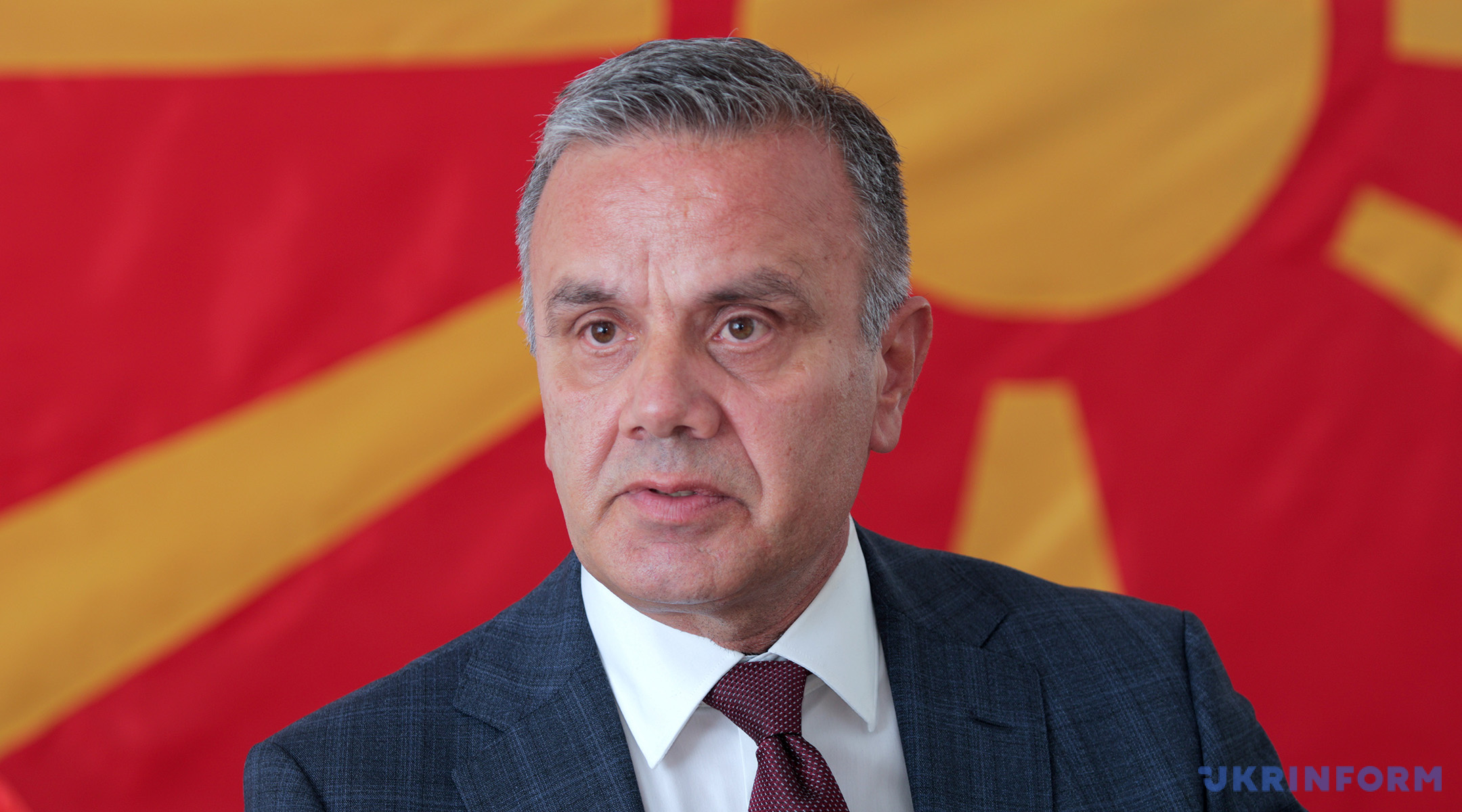
A LASTING PEACE REQUIRES UKRAINE’S TERRITORIAL INTEGRITY
– Mr. Deputy Minister, in August 2023, the Republic of North Macedonia joined this G7 countries declaration on providing security guarantees for Ukraine. How are these guarantees currently perceived in the Republic?
– We came here actually to show our support for Ukraine. We’ve been supporting Ukraine from the very beginning of the war. Actually, we’ve been supporting it from 2014 after Crimea was annexed by Russia, and not many countries in the world voiced their concerns about that.
The best guarantee is that Ukraine should enter NATO
We are very much in support of the peace initiatives by the American President, Mr. Donald Trump. But we have to be careful what will come out as a result of this peace initiative. We’re looking forward to the meeting between President Zelensky and also Russian President Putin in order to settle for durable and just peace. So, from the very beginning, we are speaking about just and durable peace, and it involves the territorial integrity of Ukraine.
And we understand now that there are territories under occupation, and we also understand that it’s very difficult to kick out Russia from these territories which are occupied by them. We strongly support the principle of territorial integrity as a fundamental international rule. Any change of borders, if legitimized by international bodies, would set a dangerous precedent—making it extremely difficult for other countries to oppose future cases of secession or occupation. Such actions would be unprecedented and destabilizing. At the same time, we recognize that some Ukrainian territories are currently under occupation and cannot be regained by force for now. However, it is essential that Ukraine never recognizes these territories as lost. So, we support you in that respect, that they are occupied by other nation, and also that geopolitics changes over time.
We don’t know what is going to happen after 10, 15, 20, 40 years. As far as guarantees are concerned, we understand that Ukraine should get the best guarantees they could get from the European Union, Western European countries, NATO countries, the United States of America. We also understand that Russia has a claim, actually, that Ukraine should not get into NATO, they said this is the cause of the war. So, we can work around that. There are other ideas how the guarantees should be given to Ukraine. Especially it is important that the guarantees should be given by the biggest Western force power in the world, the United States of America. And so far, the American President Donald Trump said, that America is willing to give such guarantees.
But in general, the best guarantee is that Ukraine should enter NATO. We know that it is not possible at the moment. North Macedonia is a country which is a member of NATO, and we understand how important it is for a country to be a member of such an organization which is an umbrella organization, if Ukraine had been a member of NATO previously, this war should have never happened. Russia has actually a lot of problems, as they say, in general with the neighboring countries becoming members of NATO, and if Ukraine enters NATO, they will feel threatened, which is only an excuse because many countries now, Baltic countries, Finland and Sweden, they enter NATO, and it was their wish. It was not – nobody forced these countries to enter NATO.
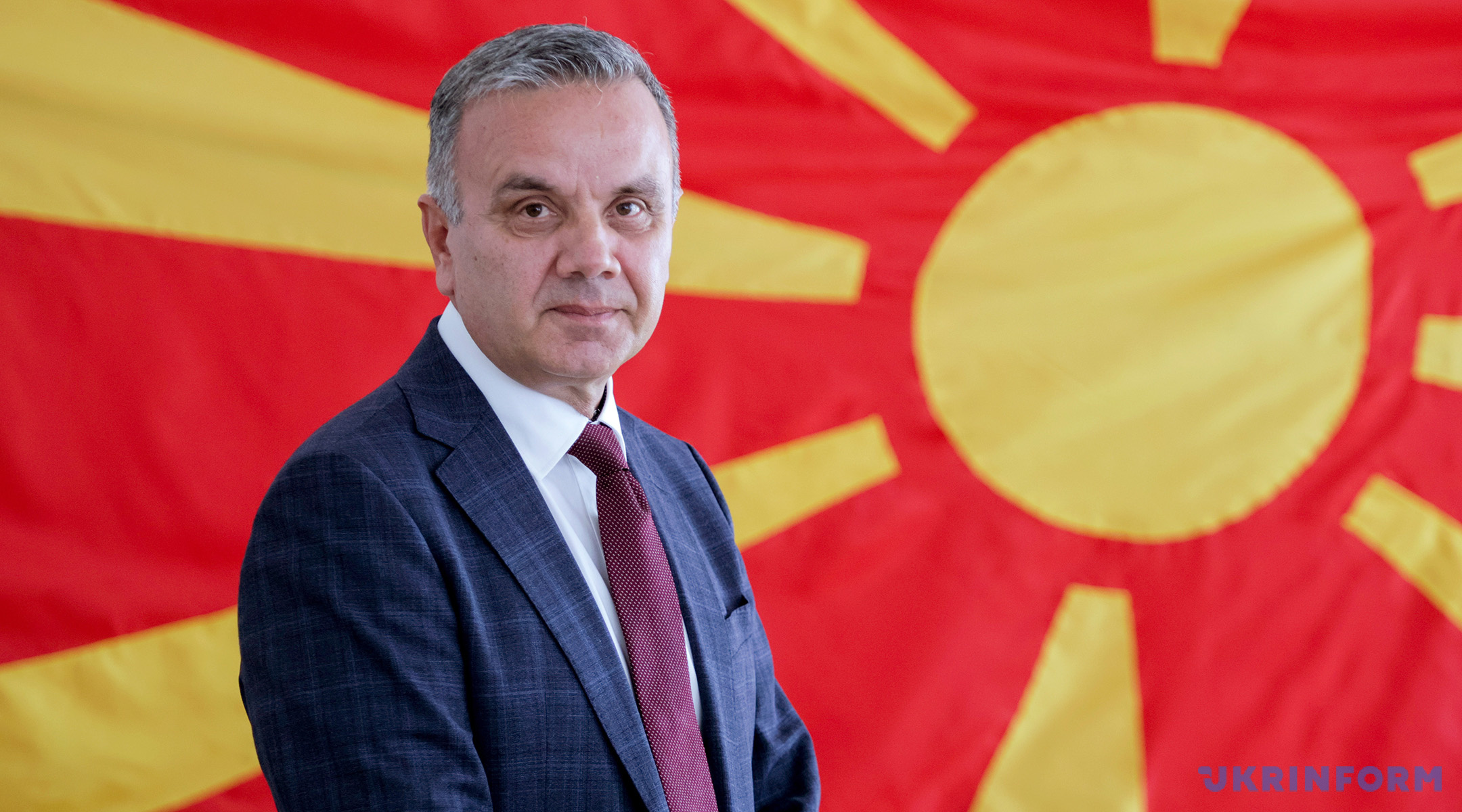
– And they entered actually after the full-scale invasion…
– Yes, some of them after the full-scale invasion, like Finland and Sweden, so they feel threatened. So, we also understand that there should be some guarantees that the war should not go on after the ceasefire, and they should be durable. We also see an important role for the United Nations, since multilateral organizations are crucial—both for countries like North Macedonia and for Ukraine.
– At the moment, it’s still unclear if the Russian leader will say yes to this negotiation, because they made statements that our president or our authorities are allegedly illegitimate, or also that it was understood wrong and it was only a higher rank of another delegation. So, they are playing with these upcoming negotiations, and we still don’t know what it will be. But you met our president during the National Prayer Breakfast. Have you heard maybe any statements? And how do you evaluate the Ukrainians’ attempts to pursue peace?
– Today’s [August 25] prayers were also very important. It may not be a matter of divine intervention, but these gatherings are very important because they demonstrate solidarity. So, we see actually the Ukrainian position is very tough because a lot of things are on the table, territories, guarantees, and what will happen in the future with all of this.
There needs to be a peace arrangement that ensures long-term security guarantees for Ukraine and all of Europe
But in general, we see your position as very productive and so that you agree to sit at the table with the aggressor. Although it’s very difficult for you, but it is a first step. Of course, this is a peace initiative led by the United States under Mr. Trump, but ultimately, he emphasized that Mr. Zelensky and Mr. Putin need to sit down themselves and engage in dialogue to resolve the issues. On the other hand, the U.S. initiative has been productive in the sense that Russia has agreed to come to the negotiating table. Previously, it was difficult, as they were denying any willingness for a ceasefire or negotiations. Now, we are likely moving in that direction. We will see. You can never believe, you can never trust what will the other side say because they keep moving with bombardment, bombing and firing civilian infrastructure.
In the end, nobody can push Ukraine to give up its territories. Of course, some territories can be reclaimed by force, but overall, there needs to be a peace arrangement that ensures long-term security guarantees for Ukraine—and I would say for all of Europe. If the war is stopped now, it reduces the risk of it spreading to other countries, such as Moldova or possibly the Baltic states (although I don’t believe Russia would attack any NATO member) .
And so in general, your position, I see where it is now, and it can bring a lot of fruit if the other side, of course, if they sit at the table and negotiate a peace solution for the region.
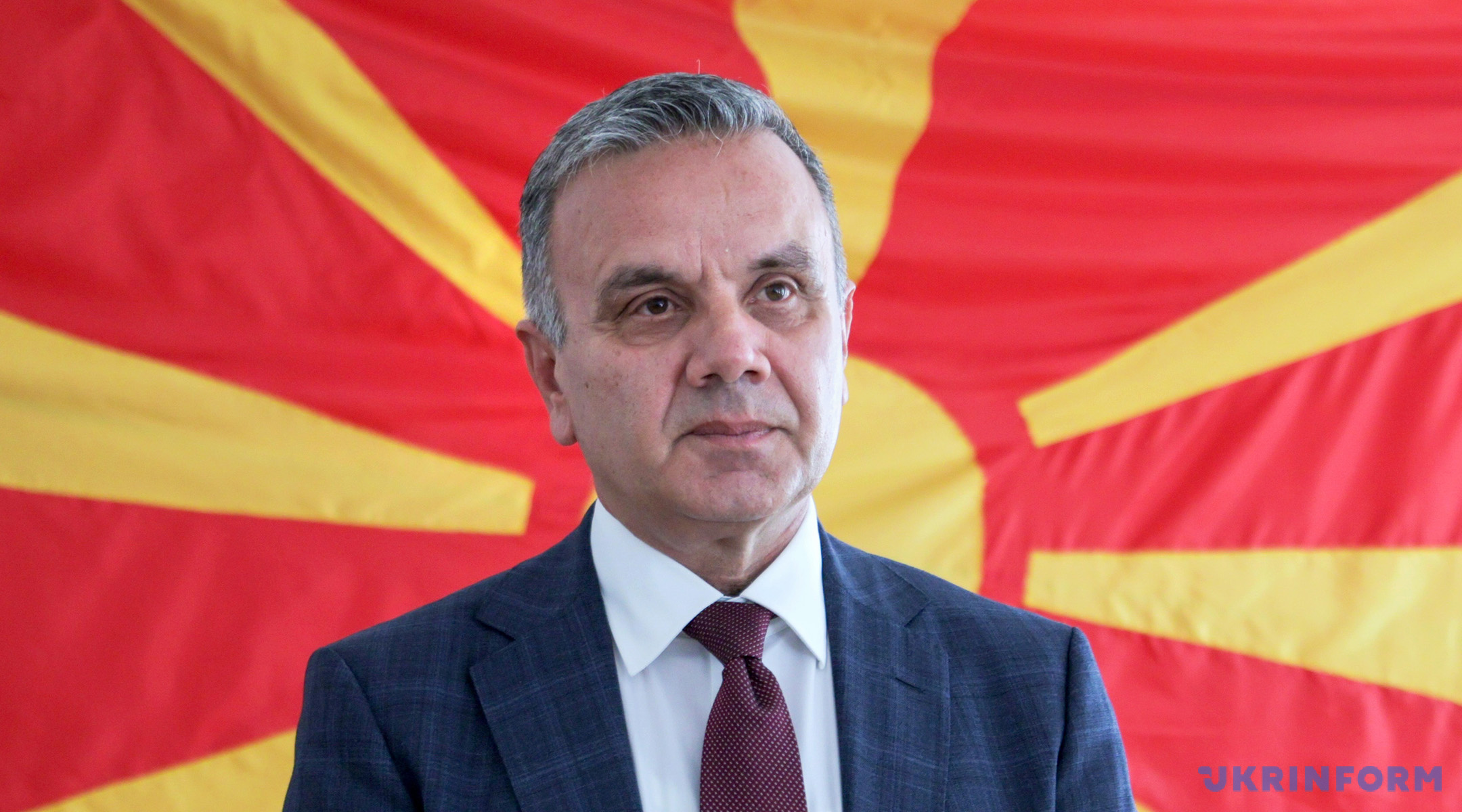
UKRAINIAN MILITARY POTENTIAL IS IMPORTANT FOR THE EU
– You mentioned that North Macedonia was one of the few countries who were already concerned when Russia broke into Ukraine’s sovereign territory, meaning Crimea. And then after Russia’s full-scale invasion of Ukraine, the government of North Macedonia gave all of its tanks and its Su-25 attack aircraft. Could you please elaborate more on this and also how the Republic of North Macedonia is planning to develop its army, modernize its army, and maybe use some of the experience of Ukraine in this?
– Yes, our solidarity and support for Ukraine are very important to us, not only morally but also politically. As we know, the very day Mr. Putin launched his aggression against Ukraine, he later justified it by claiming that Ukraine is not a sovereign nation and even questioned the Ukrainian identity—suggesting that Ukrainians are, in his view, essentially Russians who happened to become Ukrainians. And we know that this narrative is terrible, and actually we experienced this narrative through years, because also the Macedonian identity was denied by some of our neighbors, our language was denied, as your language Ukraine is denied. But if you’re questioning someone’s identity, someone’s original in the historicism of a nation, it’s actually, it’s a former medieval behavior, it’s not an issue for the 21st century, that each and every nation should have a right to sovereignty, to develop its identity.
So that’s one point. The other point about the military support, so we are actually, as I was looking to the numbers, the fifth nation among the NATO members which has given the most military support, if you count it on GDP per capita. We are not Germany and France, we cannot give you much money or much military equipment, but if you count GDP per capita, we are the fifth nation among NATO members that has given, not only military, also humanitarian support. And as you mentioned, there were a lot of tanks that we’ve given. I’ve seen one tank when I was in February with a group of Southeastern European members in Kyiv. I’ve seen a picture in the media of one of the Macedonian tanks with the flag actually fighting on the ground. And I was very proud of that. I’ve seen that some of our tanks are actually used. They are older Soviet era tanks, but they were doing their job still. Also, some of the aircrafts, some of the helicopters that you’ve given to us actually.
– We’ve given it to 2001…
– Yes 2001, So, in the end, we turn to you out of genuine support, with no quid pro quo—there is no business or personal gain involved. This comes from the heart of the Macedonian people. The government exists to serve its people, and we recognize that just as Ukraine supported us in 2001, we now want to support Ukraine.
Their fight for freedom is just, and we are committed to helping. We are a member of NATO and have a clear plan for developing our armed forces. We receive substantial support, primarily from the leading NATO member, the United States. At the last NATO summit, we agreed to increase the share of our GDP invested in defense. Currently, our defense spending is already above 2%, and we continue to maintain and build on that level. It’s a huge burden for our budget, because we are a very poor country, but we understand in the end, it’s very important to have an army which can contribute to NATO. As NATO-member we are also present with our army in different NATO deployments – in Romania, the Baltic States as deployment of NATO forces, but also in the region like Kosovo. So, it’s very important for us that in the future, we will hopefully increase the budget that we’ll give to the military.
– Although you represent the Ministry of Foreign Affairs rather than the Ministry of Defense, are there any discussions about holding joint military exercises with the Ukrainian army that is gaining hard-earned experience in modern warfare?
– In this regard, we firmly appreciate the decisions made by NATO. And tomorrow, of course, we are ready to participate in any exercise if there is a NATO decision about that. Ukraine develops an army during this war, with a lot of victims, of course, but in general, you developed military capacity, and it will be very important for tomorrow’s European Union.
Both of our countries are candidates for becoming members of the European Union, we are knocking the door and support each other in becoming members of the European Union. And as far as we understand now, it is also important that Europe takes the responsibility of its self-defense. NATO is there, the Americans are there, they won’t be hopefully revoking their military presence in Europe. But even if they do, we understand that Europe will invest much more money, not only NATO mechanism, but also the countries themselves to defend themselves. And to contribute to this common goal to defend the free nations.
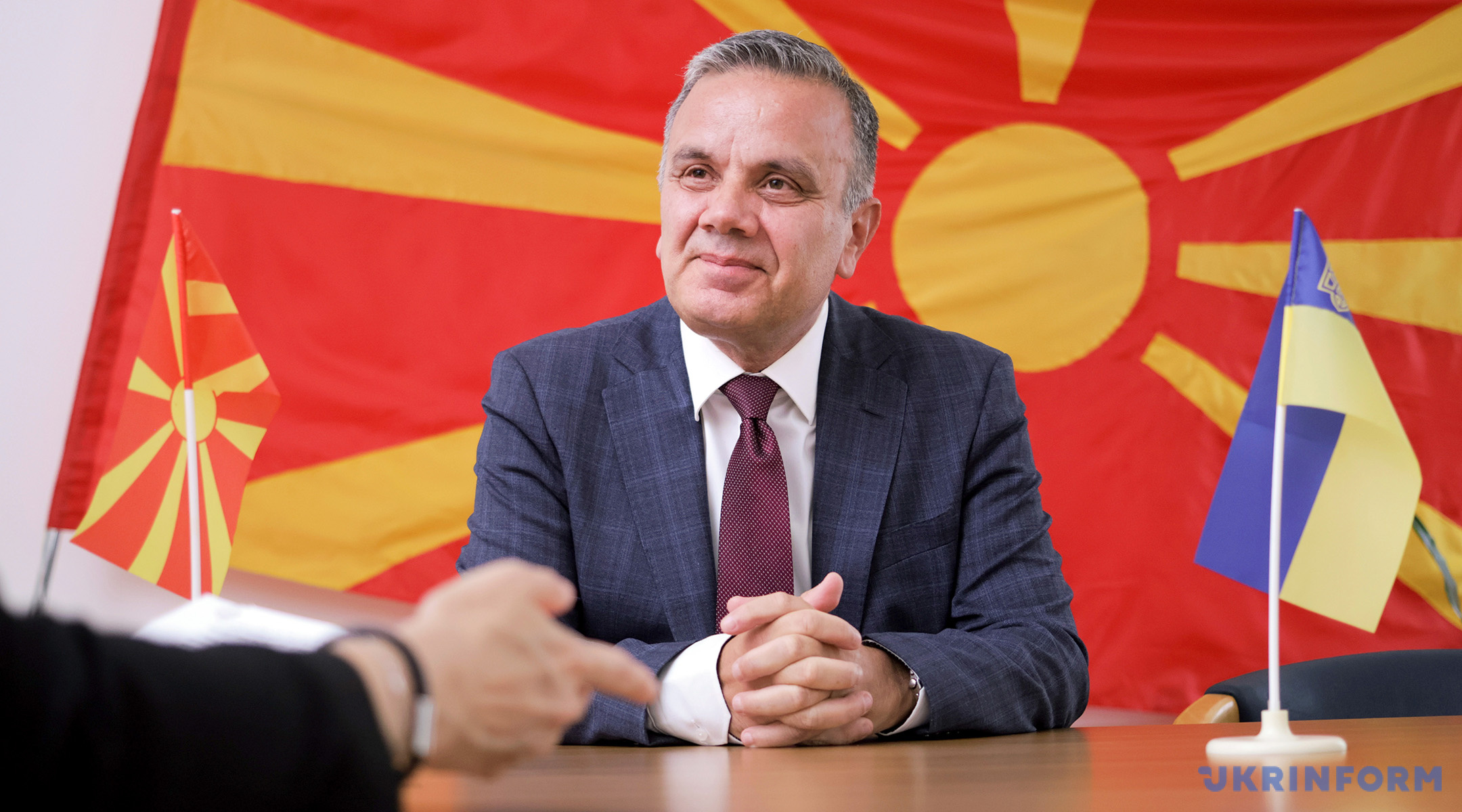
WE WILL SUPPORT UKRAINE FOR AS LONG AS IT TAKES
– You mentioned the UN and how North Macedonia is supporting Ukraine. Maybe there are other international organizations that you want to talk about where we have your support?
– Yes, we have strong cooperation with the OSCE, the Organization for Security and Co-operation in Europe, which has a broad mandate. At a time when peace initiatives are underway, I believe the OSCE can make a significant contribution to any peace agreements. In fact, North Macedonia hosted one of the OSCE conferences a few years ago, demonstrating our active engagement with the organization. One of the main issues there, even with Mr. Lavrov’s participation, is that this organization—where Russia is also a member—must continue to function effectively. The OSCE unites the entire continent on security matters, but its work was significantly hindered for some time due to Russian actions. Now we understand that this is the organization where if we put a lot of efforts in it, actually for the dialogue, so we support much Ukraine through this organization.
There are other different initiatives, for instance, Central European Initiative, Southeastern European Organization as well to Black Sea Organization, where we are also partners there with different nations in the region, your country, which is also on the Black Sea. And we will be supporting Ukraine as long as it takes.
WE WILL SUPPORT NEW SANCTIONS AGAINST RUSSIA UNTIL A PEACE AGREEMENT IS REACHED
– After the full-scale Russian offensive, the Republic of North Macedonia shut down Russian propaganda media, such as Russia Today. But before that, it was active for some time. In your opinion, what are the biggest misunderstandings or false narratives about Ukraine that are still present among the Macedonian people? And how does Russian propaganda feed those narratives nowadays?
– Because I’m a journalist, you know, and previously when I was one of the few when Russia Today was shut down, because some of the journalists said openly that ‘no medium that should be shut down – it’s censorship.’ But I openly stated (although I was not a politician at that time) that as a journalist, am guided by a principle quoted actually from the French Revolution – there shouldn’t be a freedom for enemies of freedom. You know, the freedom of press is okay. We are, all of us are against censorship. But if someone is an enemy of freedom, what kind of freedom he expects from us? So, a lot of people who saw themselves as liberal attacked me and said – you should read everything, even if it is ‘trash,’ and then you should decide by yourself. I said, yes, of course, you should read anything. But us, as journalists have a little bit more understanding of what is going on in the world. But the plain public may not know, may get the narratives that Russia or whoever is aggressive there in the world in a different situation and people can swallow it because they don’t have, let’s say, an expertise in understanding what is going on.
When Russia Today was shut down, I was one of the few who supported this
So, and it is very important also that these narratives, if they try to become predominant through the social media, through Facebook, other social media, and they’re doing it, they were doing it. North Macedonia has been exposed to many pro-Russian narratives through Serbian-language media. Being in the same region—part of the former Yugoslavia—these outlets, such as Sputnik in Serbian and others, are quite influential, at least online. Even if people don’t visit Sputnik’s website directly, they encounter these narratives on social media. For example, posts on Facebook might claim that Zelensky is not a legitimate leader, that he wasn’t elected, or other misleading statements. Some Macedonian portals even copied these stories. This was particularly noticeable in the early stages. Later on, maybe some understand that it is just pro-Russian media. And if you quote Sputnik, you should mention that it is not an independent news agency – it’s financed by Putin regime and this is the Russian propaganda.
Although Russia is actually during these peace initiatives now is also trying to impose this narrative that Ukraine is guilty because they were not giving rights to Russians in the region of Donbass or whatever, that “the Russian language was banned in Ukraine” and some of this kind of stuff, but there is no excuse for brutal aggression of the whole country.
So, that’s why I say the red line, the Putin regime past was attacking the full-scale invasion of Ukraine and now everyone understands that this is not a narrative to be taken at face value—it is a lie. If it were true, the various agreements, including the Minsk agreements and other peace initiatives, would have worked. They did not succeed because Russia did not honor them.
– I don’t know if it’s been reported in the Balkans, for now, Russia “liberated” people of Donetsk from the water. There is no water supply at the moment and people cannot basically fulfill their basic needs. So, in my perception, if you’re trying to save people from something, so to say, you’re trying to make their life better as well, not worse…
– Actually, there are international media that we get the news from. We don’t have correspondence from Ukraine. We are a very small country. There were a couple of brave journalist, a woman that was here from the very beginning of the war. But, you know, the problem with the wars is when t is prolonged, when it lasts 3-4 years, and when it is not the top news. And it’s very important that you keep this information up to the front in the media. In general, people understand the situation.
Historically, Russia has always been seen as an adversary to Macedonia, so public sentiment toward Russia is largely negative. On the other hand, North Macedonia is a strategic partner of the United States, a member of NATO, and aligned with the European Union. Our relations with Russia have never been particularly close, apart from some previous economic ties. Hopefully, in the future, we can cooperate with all countries, but for now, given the war and current circumstances, relations remain distant. We voted, actually, for all packages of sanctions against Russia – each and every package of sanctions that the European Union imposed on them, and we will keep doing it as long as we don’t see that the peace deal is there on the table.
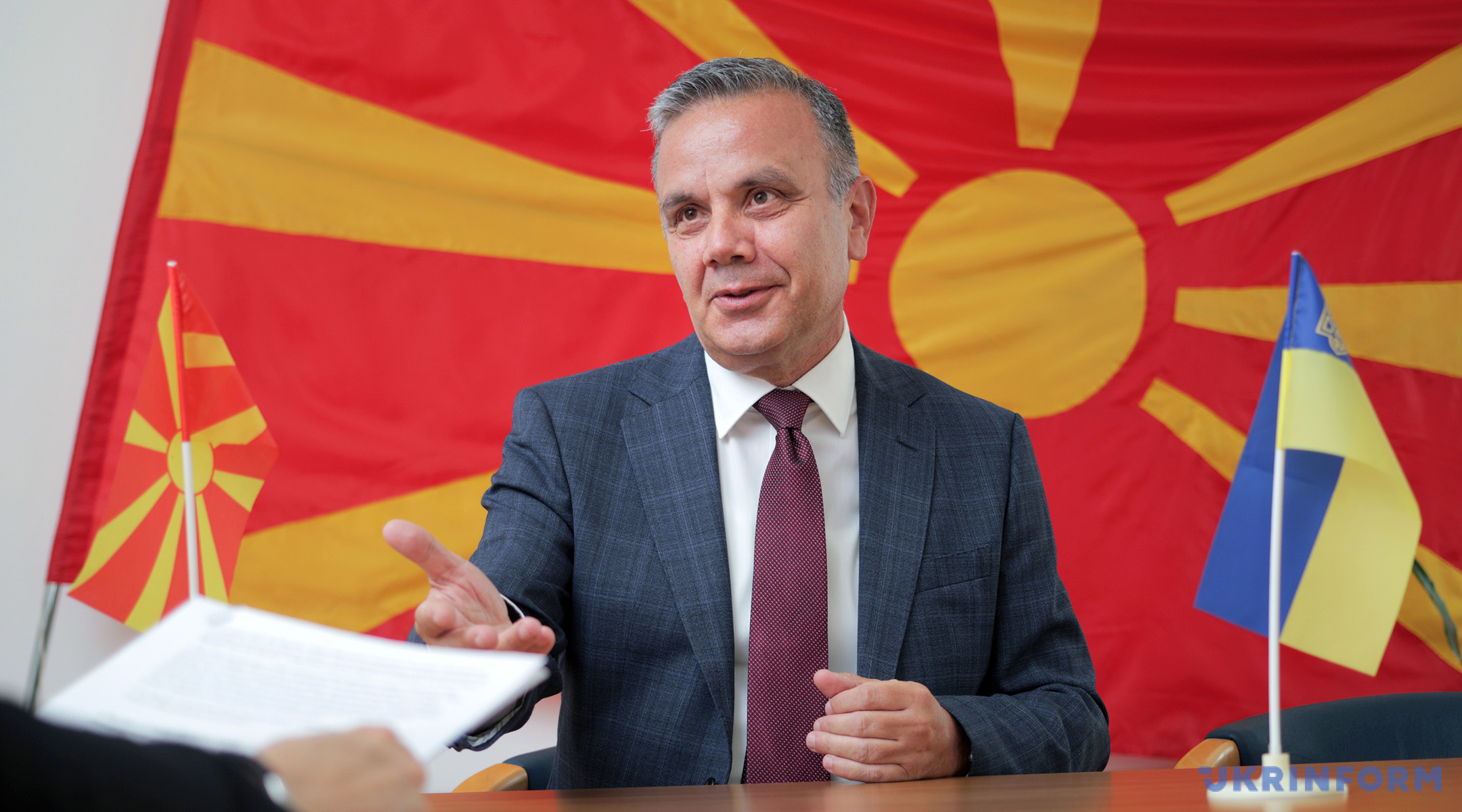
RUSSIA EXPANDS INFLUENCE IN THE BALKANS THROUGH PROXIES
– Could you please elaborate on how Macedonians were giving protection for Ukrainians living in Macedonia from the start of the full-scale Russian offensive?
– We don’t have much Ukrainians now in North Macedonia, maybe a few hundred, but they were like a couple of thousand in the beginning because of the outbreak of the war, so many people who know somebody, so they try to reach their friends, relatives, or whoever is there. But in the beginning, there were lots, and we had to change the law because some of them in the beginning were treated like refugees, and it is a different position. It’s not a refugee issue. So now they are equal citizens with others in the country, so they can afford the social health care, social services. All of them work or don’t have this kind of social problems. And unfortunately, we are not a rich country, so not many people want to come to work in our country. Our Macedonian citizens are also escaping going to Europe for a better job.
Moscow opposes Balkan states’ EU integration, could seek to ignite new ethnic conflicts
But we hope that in the future we will develop much better relations with Ukraine. We are not far away. I mean, the borders are actually 1,000 miles or 1,000 kilometers. It’s not that far.But the Balkan region, with its history and with its identity issues, is similar to what is going on actually here in Ukraine and Russia. And also, the region is impacted by Russia. Maybe not to the extent that they will attack it, but they have their proxy players in the Balkans, in Republika Srpska, in Serbia, also among some politicians and elites. And they try to impact the region in a sense that they wouldn’t like the region to become members of the European Union, because it’s not in their interest. That’s one thing. The second thing is that they would like to see probably ethnic clashes again in the region, because the Balkans, you know, it’s like a powder cage, as we say. There are some unresolved ethnic tensions and issues now, the things that are going on in Republika Srpska, in Kosovo and Serbia. There is a peace so far, but we don’t know what could happen if some of the foreign players, and Russia is one of them, want to use them as a tool just to provoke a new crisis, a new war. So, we have to be very careful.
NATO is all over the region. North Macedonia, Albania and Croatia are members of NATO. NATO is present in Kosovo. There are headquarters of NATO in Bosnia and Herzegovina. It is more or less covered, but we have to be very careful in the future that, although the Russian forces cannot come there, because they cannot fly over the borders of different countries, but they can work through their proxy players in order to incite some ethnic clashes.
– And to sum up, what would be your message to the Ukrainian people…
– I know that you suffered a lot, but I want you to stay strong. When I see, when I go to the Maidan Square and see all of these soldiers [each flag on Maidan Nezalezhnosti signifies a fallen soldier], but also many civilians who lost their lives, it’s really heartbreaking. And I hope that the other side will not only understand it, that, if Russia wants to get back to the world, it is one of the last chances also for them, because the isolation, so maybe they can go through it for a year or two, three years, but the isolation of the world, the whole free world understands that I’m pointing to Russia as an aggressor, they don’t want them in the free world. And I think that these peace initiatives will give fruit in the end. And so my message to Ukrainian people is stay strong, the peace is coming, and you will stay a sovereign nation with territorial integrity, and hopefully a nation that will join the European Union very soon, and we will be there as allies.
Anna Kostiuchenko, Kyiv
Photo credit: Yevhen Kotenko

